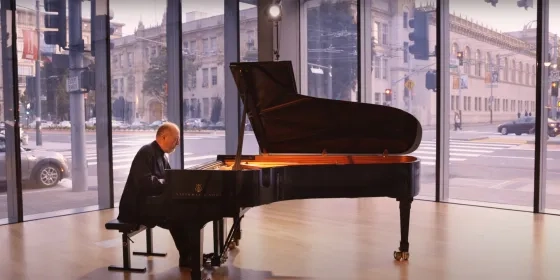Garrick Ohlsson on Challenges, Changes, and Chopin
Ohlsson, the first and currently only first-prize American winner of the Chopin International Piano Competition, explains his history with the composer and how the critical appraisal of Chopin has changed.
By Alex Heigl
What is your experience with this piece?
I grew up in White Plains, New York, and I went to concerts at Carnegie Hall quite frequently, so by the time I was 18 and an undergrad, I had probably heard seven or eight of the world’s greatest pianists play this piece. I knew I wanted to play it, but didn’t get around to it until I was in my mid-20s. The F Minor Fantasie was the so-called ‘filler piece’ for recording Chopin’s four scherzos, because they don’t fill two sides of an LP record. The first three fit on side one, and then the fourth takes up half the second side, so you need something to fill it up.
When did you finally make the leap to learning and recording it?
At the time, I had just won the Chopin prize, so I was recording a lot of his works, that was my cubbyhole as an artist: ‘He won the Chopin prize and Chopin sells records, have him record Chopin.’ So I finally determined to learn this piece, which is one of Chopin’s most extroverted, showy works. I would almost say it’s the closest he comes to Liszt: making grand statements, big operatic sweeps up and down the keyboard, showy, brilliant octaves.
What are some of challenges presented by this piece?
The most obvious technical challenges of the piece are the semi-contrary octaves, when the music becomes really big and heroic and the hands have to go to the opposite ends of the keyboard without crashing and burning. And yet they’re not Liszt octaves, where they’ve been fired like out of a machine gun. It must sound enormous and brilliant, but not bang-y. The other challenges are fluidity; there’s a lot of almost Baroque-y, romantic Chopin triplets around the melody, and you have to make them sound like these beautiful Italian arias.
I had played this a number of times, including in Poland, where Chopin was born, and there he’s considered practically a secular saint, part of the soul of the nation. When I played in Warsaw in 2010 for his 200th birthday, one reviewer praised me for “understanding the nationalist content in the Fantasie.” So I said to another reviewer, “I’m very pleased I did that, but I didn’t know I was doing that.” And he said that there is apparently in Polish history some military song or march sang in the military, and there’s a dispute as to whether Chopin—who rarely quotes tunes—is actually referencing this in the Fantasie.
How have attitudes towards Chopin and his work changed over time?
In the 19th century, the view towards Chopin was almost,”‘anything that sounds this gorgeous can’t be good for you. Let’s have a slow Bach fugue instead.” So Chopin had a bit of the curse that Mozart, Tchaikovsky and Rachmaninoff had, where people thought anyone writing these big beautiful melodies can’t be serious. I remember once I was playing at the Teatro Colón in Buenos Aires, playing Chopin, and they had a fireman backstage, because the theater is made of wood. And the usual ones who work there get into the music; so one asked me that night, “Maestro, what’s your program tonight?” And I said, “all Chopin,” and he responded, “Ah, the old ladies will like that very much. They’ll cry.” So in the middle of the 20th century, artists like Rubinstein had to campaign on Chopin’s behalf and say, “No, he’s so much more than music for weeping into your tea cups.” Now, of course, there are entire conferences dedicated to his music, which there didn’t used to be 100 years ago.
Over the years, how has your approach to the Fantasie changed?
I can’t tell you there was any single pivotal change in my approach to this piece throughout my life. It was organic, the way you learn anything throughout your life and your viewpoint switches. There’s an old joke: “I saw Hamlet in college and again at 50. Boy, it had changed a lot!” All my old great teachers used to say that every time they’d come back to a masterpiece they’d discover new things in it.
Learn more about Garrick Ohlsson or studying piano at SFCM.
